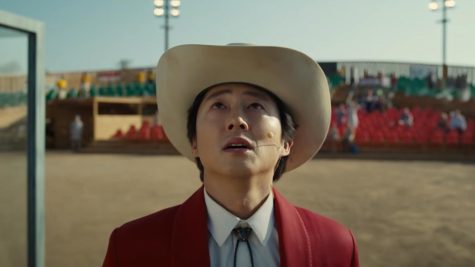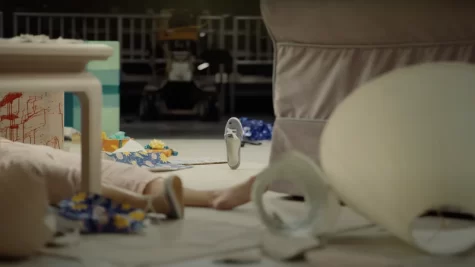The Brutal Irony of Logan Paul’s Review of Nope
Still image of Nope and its biggest hater.
October 14, 2022
WARNING: The following contains spoilers for the film Nope. Check the film out if you haven’t already.
“I will cast abominable filth upon thee, and make thee vile, and will set thee as a spectacle.” (Opening quote of Nope).
I have been thinking a lot about Jordan Peele’s latest feature, Nope. I’ll be finishing college work, doing homework, or working at my summer dishwashing job just thinking about how good it is. I’ve basically been obsessed with the film since the summer because it’s so cinematically rich and filled with creative and subtle messages. I love the film, but I do understand if people don’t like it that much. There’s a lot to love, but I know that there is some stuff to dislike. However, I was surprised when I saw a popular negative review of this film. At first, I was interested in seeing a review that got down to things I overlooked, but I was wrong. All it was was a list of weird dislikes and plot hole grievances that weren’t even that huge. Then I scrolled up to see Logan Paul’s name as the author of the review, and it all made sense.
I know what you’re thinking. It’s really weird that I would go after a specific movie review considering that I write movie reviews. But I just reached a breaking point with Logan Paul’s rant. For someone who hasn’t seen the movie, it’s such a weird, nitpicky review. But for someone who has seen and appreciated the movie, it’s the funniest thing ever written. And it’s not just because I love the movie. When you look at what the movie is trying to say, it’s funny that someone like Logan Paul doesn’t understand it. So, let’s see what the writer of Airplane Mode (movie starring YouTubers) has to say about Nope.

First is his take on the plot holes. Now, plot holes can potentially take down an entire movie, but the ones that he points out here are so insignificant. It’s like pointing to a one-inch divot in the road and calling it a pothole. He calls out how “the park is creepy for the sake of being creepy,” and he questions, “how did a quarter shoot through a man’s face,” “why was the cinematographer being cryptic,” “why were there title cards,” and “why did the ET not know the difference between a balloon and a meal.” I thought I’d go over how these details are actually all justified in the film, but I realized how insignificant they are on their own. These are not things that could derail a movie; these are just random questions that aren’t even worth asking. At most, they may be mildly weird if you don’t understand the movie, but they shouldn’t be enough to hate the entire thing.
Next is his criticism of Daniel Kaluuya’s role in the film. He claims that he is “the most mundane, vanilla character I’ve ever seen.” Then he claims that the charisma was stripped away from him for this movie. First, if this is implying that Kaluuya’s performance was terrible then he is wrong on so many levels. Kaluuya may not be spitting out classic one-liners or jumping with joy like his charismatic co-star (Keke Palmer), but he does such an amazing job. Kaluuya as OJ was perfect in keeping the audience invested in the story while showing you what it really means. Yeah, he may be a little more of a calm and mundane person, but that shouldn’t be a complaint. He still has his moments, like when he says “what’s good” to his horse or when he and Keke Palmer do the greatest handshake in cinematic history. And when he’s not doing this, he’s completing the harder task of subtly acting. Even though it’s not obvious, it is so much harder to act without lines than to act with lines. OJ is quiet in most scenes so it is astounding how well Kaluuya performs.
Finally, I wanted to dissect his first statement. “It’s not hard to conceptualize something disturbing (a trained Chimp goes animalistic and mauls an entire set, or a UFO devours anything in its path) — it IS hard to sensibly tie it to the plot, which was done remarkably poor here.” I don’t want to be that one hateable film-nerd who goes around saying “you didn’t get the message,” but give me a break with this statement. This entire statement just reveals that Paul did not understand what the movie was trying to say. He even said, “Jupe has trauma with the phenomena of commercializing predators for profit, and for the last six months, he’s been feeding horses to an ET in the sky.” To get to how stupid everything about this single statement is, I’m going to have to explain the film’s message. You can skip over the next few paragraphs if you don’t want to hear me explain the entire message of Nope, but strap in if you wanna hear it.
Nope focuses on two different timelines. One timeline takes place today while the other takes place in 1996. While we focus on the plot in the present day, we hear about the plot in 1996 a lot. In 1996, the man who would grow up to own Jupiter’s Claim, Jupe (Steven Yeun), is the star of a popular 90s sitcom called Gordy’s Home. The show is about a family who adopted a monkey to be part of their family. In this plot, the show was filming an episode, “Gordy’s Birthday,” which features a moment where balloons fly up and out of a box. However, when the actress launches the balloons out of the box, one of them pops in a light which freaks out the live monkey on set. In fear, the monkey brutally mauls the young girl and begins to attack several other people on set. During this, Jupe sits under the table to hide from the monkey. He sits next to where the girl’s shoe flew off. It essentially answers the film’s earlier question: “What’s a bad miracle?” At the cost of peoples’ lives and in tragedy, he is locked into the impressive feat of a shoe standing on its heel. Essentially, the spectacle was a bad miracle.

The film is essentially the message of people who chase the miracle in tragedy. After the attack, Jupe was left with trauma, but he spends the rest of his life exploiting this tragedy for his own benefit. He has a private room filled with memorabilia from the attack that he charges people for, monkey figurines and monkey masks are his primary selling points, and he never describes what really happened in the attack. Instead, he uses an exploitive SNL skit to put himself in the system of manipulating a tragedy into a spectacle.
And that’s how it ties into the main plot of the present day. As OJ and Emerald try to capture footage of “the alien,” they’re essentially doing the same thing that Jupe has been doing. While they see it as trying to get “The Oprah Shot,” they essentially want to get rich from several deadly attacks. This thing in the sky has been killing their horses and innocent civilians, but they wanna profit off of that event. While the exploitation of the Gordy attack feels more vile, OJ and EM are still doing the same thing. These tie together into the theme of what we as a society do to get a spectacle. What do we do to both make and witness that spectacle?
Then there’s Logan Paul, who maybe has the most notorious example of this. In 2018, he posted a video titled, “We Found a Dead Body in the Suicide Forest…” A person tragically committed suicide and Paul’s tour guide knew him in school. As his posse told him to “bring the camera,” they filmed closeups of the dead body and their reactions to it. By filming a full video of them commentating on this event and then showing the body, Paul was chasing a spectacle. How would anyone top a video about discovering a dead body? Using the words, “this has never happened before in YouTube history,” he was out to exploit every last drop of this tragedy. And even if it was published to “spread a good message about how suicide is wrong,” he’s still using that good message for his own attention. This is why it’s so funny but also exhausting to me how the message of Nope flew right over Logan Paul’s head.
Normally I wouldn’t write full length explanations of why a review is wrong, but there was something so misguided and ironic about this review. Nope could’ve had more success had this review not discouraged so many movie-goers. And it’s even funnier to think that the film’s biggest antagonist is the personification of the film’s antagonist.
















































































































































